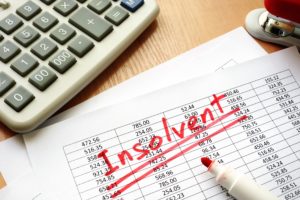New managing partner named at LCF Law
The Dangers of an Insolvent Estate
 Harrogate based Personal Law Partner , Mark Jones, looks at the steps to take if you should find yourself as an executor dealing with an insolvent estate.
Harrogate based Personal Law Partner , Mark Jones, looks at the steps to take if you should find yourself as an executor dealing with an insolvent estate.
At LCF Barber Titleys many clients come to see us when they have been appointed as Executors in the Will of a relative or friend who has died. It can be particularly important to take proper legal advice if you are an Executor of an estate that you think might be insolvent.
The Executors are the people who are named in the Will to deal with the estate and their duties include identifying the assets and liabilities of the estate, collecting in the assets and paying off the liabilities before dividing up the balance of the estate in accordance with the terms of the Will.
An insolvent estate is one where the total value of the liabilities of the estate comes to more that the value of the assets. There will be nothing left over for the beneficiaries of the estate and it will be impossible to pay all of the creditors in full.
Where an estate is insolvent, there are legal rules setting down an order of priority for how the costs and liabilities of the estate should be paid and, in particular, which creditors should receive what. If you act as an Executor of an insolvent estate and distribute the cash available in the wrong way you can become personally liable to the creditors who lose out.
The best option can often be to renounce probate before becoming involved in the estate. This means that you sign a form formally giving up your right to act as Executor and it is then left to one of the creditors to deal with the estate. This releases you from any duties or liabilities in relation to the estate.
While there are one or two urgent matters that it will be sensible to deal with, such as securing the house and ensuring it is insured and arranging the funeral, you can only renounce probate before becoming actively involved in dealing with the assets and liabilities. The problem is that it will often not become apparent that an estate is insolvent until the Executors are already too deeply involved to renounce probate.
So what should you do if you find yourself dealing with an insolvent estate?
The steps to take will include:
- Fully identify and encash the assets of the estate and identify the outstanding liabilities.
- It is good practice to let the beneficiaries and creditors of the estate know that it may be insolvent so that they are aware that they might not receive everything they are entitled to.
- Consider advertising in the London Gazette and a local newspaper for any creditors of whom you are not already aware to make themselves known, which can protect you after certain time limits from being sued by such creditors.
- When you have identified how much will be available, distribute it in accordance with the relevant legal rules. Secured creditors (i.e. creditors whose debts are secured on particular assets) will generally have the right for their debt to be repaid in full from those assets.
From the remaining available funds, the cost of a basic funeral comes next, followed by the testamentary and administration expenses (such as the legal costs and expenses of dealing with the estate).
Certain preferential debts should be paid next which include things such as contributions to occupational pension schemes and remuneration of employees of the deceased's business.
Finally, there are the ordinary debts of the estate which are those which do not fall into any of the earlier categories. There will be insufficient funds to pay these debts in full and they are therefore reduced pro rata. In other words, each of the debts is reduced by the same percentage to use up the available funds.
There are three particular points to bear in mind:
- If you act as an executor of an insolvent estate and do not distribute the available funds in the right order or priority, you will be personally responsible to compensate those who have lost out.
- A common trap is that executors can pay certain debts in full in the early stages of the administration only later to discover that the estate is insolvent and that they have paid too much to those creditors. It is therefore wise not to pay any liabilities of an estate until you are absolutely sure there will be sufficient funds in the estate to pay everything.
- Another common trap is that Executors can made judgements with regard to which debts to pay. For example, they can feel that local tradesmen should be paid in full because they need the money more than big organisations. The order of priorities set down by the law does not allow such judgements and they could prove expensive.
Most important of all, take proper legal advice at the earliest possible opportunity and certainly before involving yourself in the financial aspects of the estate.
 This article was written by Mark Jones. Mark is a Partner in our Personal Law Department and is based in Harrogate.
This article was written by Mark Jones. Mark is a Partner in our Personal Law Department and is based in Harrogate.
Mark specialises in the creation and administration of trusts, tax planning and wills as well as probate work, particularly those where the family has fallen out and contentious issues have arisen.
Further advice please contact Mark Jones on 01423 502211 or ku.oc1714804123.fcl@1714804123senoj1714804123.kram1714804123
